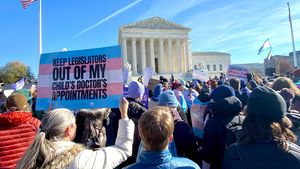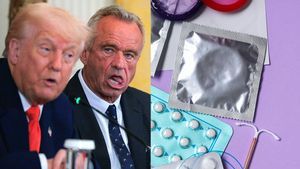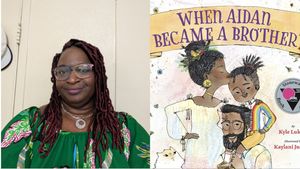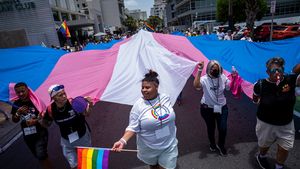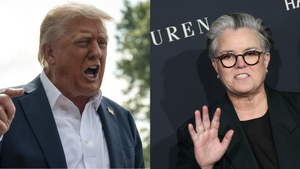"Oscar buzz" is often the product of the Hollywood machine, but at its most authentic, it's created by singular performances in which actors completely transform. Year after year, audiences are captivated by actors who create a character so vividly real it's impossible to believe they were once just words on a page, or those who recede so far inside the life of a real-life person that they become them. Renee Zellweger, who is currently an early favorite this awards season, has done the latter in Judy, a brief glimpse at the end of Judy Garland's life as she plays a string of concerts in London. Ravaged by decades of addiction, insomnia, and manipulation by the industry that made her a star, Zellweger's Judy swings maniacally from tragic vulnerability to iron strength. For a woman who has made a career of career-defining performances, it's yet another career-defining performance.
Ahead of the release of Judy this Friday, Out spoke with Zellweger about finding her way inside Judy, how she's being intentional about maintaining her agency in her big Hollywood comeback, and what it means to be a gay icon.
Out: Congratulations on the film. I loved it so much and I'm so excited to chat about it, so if you're ready, we can dive right in.
Renee Zellweger: Thank you, that's kind. I'm glad that you liked it, that makes me smile.
Approaching the idea of playing Judy Garland, is that more exciting or more intimidating?
Terrifying is a good word. It was terrifying. I was thrilled by it, by what it was that they were wanting to do. I loved the idea of the film and their reason for wanting to make it, but I have absolutely no understanding why they sent this script to me because I don't consider myself that kind of performer. So then it was more about curiosity than anything. And then it became all about denial, and as long as I could just pretend that this was an exploration and a very private personal celebration of her, then it felt like it might be a really fun thing to embark on, you know?
Right, because the film focuses on a very short period of Judy's life, very close to the end of her life. Do you think that's a more effective way to really get an understanding of who this woman was rather than some sprawling biopic?
I think that they're both useful, and enjoyable in different ways. There was already a beautiful [film] that had been done by Lorna Luft, based on her autobiography, Me and My Shadows. And it was a gorgeous film, I loved it so much. But this is a smaller story, I would say, but also larger in scope in terms of intimacy. It feels like this was concentrating more on the private moments and the cost of performance on that level for a lifetime, rather than chronicling her rise to stardom.
A lifetime of performing and addiction took its toll on Judy's body, and watching the film, I was so struck by your physicality. Was that one of the ways in for you in figuring out how to play Judy?
Probably. It's funny, there were so many little things that we stumbled on or discovered in the process that seemed to be key, that they really mattered and that we needed to correct them. And I talk about it as a "we," because it felt like it was always a collaborative process. It was never just me by myself except really in the car and at night when I was going down the rabbit hole or singing on the freeway.
There were certain things about her, the way she carried herself, and just qualities about her and little characteristics, idiosyncrasies, that were uniquely identifiable as Judy. So we were sort of mining for treasure as we went along, and her posture and her body language and her performance language were definitely important factors for us in trying to conjure her essence.
The flashbacks in the film illustrate how Judy had so little agency when it came to her early career and the roles that made her so beloved. Do you think that those scenes take on a greater significance in the current political climate and in the wake of #MeToo? And what do you think we can learn from her story?
Oh gosh, there's so much to learn. I think it's important, probably, to take into account the time, and that people were really ignorant about so many things back then. There was so little known about addiction and disorders that come from psychological abuse, that may not even have been recognized as such during that time. I don't think that it was necessarily nefarious that she was sent down this path, a path of a lifelong struggle, and that people were aware of the sacrifice that they were choosing on her behalf, but rather it was part of the deal. You know, this is helpful because what we want is for you to be able to perform for a lengthy period of time and to not feel tired, so we're going to give you this to help you, and we know that you want to look like the ideal and fit the paradigm for beauty of the day, and so we're going to help you with that too. So I feel like the ignorance played a large part in setting her on that path to destruction.
And has it changed? I mean, thankfully, yes, because we're having the conversation now, and hopefully we've been enlightened to some of the dangers of certain choices and putting priorities of maybe commerce over humanity. It's sad that it's taken such a long time for us to have those conversations, though. And it's sad that she had to live with the consequences of those decisions being made on her behalf.
How did your own experience of fame inform how you played Judy?
That's interesting. I don't think it was something that I was aware of when we started the process. There's a certain bit, of course, that I understand about the gulf between what's reported about a person's public persona and the truth of the life. And I also understand that... I don't know, I guess the truth of a life behind the spotlight, which is like everybody else, only there's a bit of speculation about your personal struggles, and people tend to fill in the blanks and it's not often so kind. So I guess through my own experiences, I can empathize a bit with what that must have been like, especially at a time when, as you said, women had no agency and didn't participate in determining the narrative of their public lives in the way that women can today.
You stepped out of the spotlight for a few years and the industry is definitely creating a "comeback" narrative around this film. Thinking about this idea of female agency in Hollywood, how are you now being intentional about maintaining your own agency in the industry?
There are certain limitations to that because I work in a collaborative medium, but in terms of priorities, that time has given me new perspective. When you're in the middle of it and you're keeping professional promises because, I don't know, I feel a responsibility to the people that I'm collaborating with, and in the mix of it, it's pretty fast paced and it's a little difficult to recognize the chaos as it's starting to brew, and its consequences, and it takes a while for those to be felt. I'll do a better job this time in prioritizing my own humanity.
Judy Garland is one of our most celebrated gay icons. What do you think enamored her so much to queer people?
It's such an interesting question, and I've discussed it with a lot of my friends because I was curious, too, and my presumption was that maybe it begins with that journey that we take with her as children, where if you feel like you're a child who's misunderstood or that you don't belong or that somehow you're not enough, and you sort of, I don't know, watch and share that journey with Dorothy in The Wizard of Oz and her misfit friends who also feel misunderstood and incomplete, that it's a journey to the place where you do recognize you're enough. I think that's pretty powerful in the imagination as a child, and I think it would be indelible, especially for a child who feels ostracized.
And then there's the parallels to her own life, because inevitably she felt herself misunderstood, and she was a survivor, and she would overcome no matter what the challenges might be. She never stopped hoping. I think that that is inspirational for anybody who feels the world is not on their side.
The things that she sang about, the personal struggle and dreaming about a home and love and being able to hold onto something that belongs to you and to be seen, I think that her audiences felt understood when she sang to them. And seen.
And she acknowledged the community in a way that was really rare during that time, and she acknowledged the community with appreciation and love. I mean, it's impossible to put a value on that in terms of what that must have meant at that time.
Absolutely. Renee, you are something of a gay icon yourself.
Aw, come on!
You are! You can't deny it. I recently asked Sandra Bernhard what being a gay icon meant to her, she said it meant that she's "done everything right." Does that resonate with you?
Oh, wow. Wow. Oh, gosh. Oh, to be in a place where you could actually say that about yourself. Good for her.
What does it mean to you to know that you are beloved by queer people?
I have to let that sink in, because in the moment, personally right now sitting in my car, I'm celebrating. That's a really special thing. That's a special thing because there's reciprocity there and it's a bigger conversation about why. But I can just tell you that I'm grateful. I'm really grateful.
We are very grateful for you. A final question: What was harder: singing "Over The Rainbow" or learning the choreography for the "Hot Honey Rag" in Chicago?
[Laughs] That's a great question. Okay, I won't say difficulty because they were both full rotten experiences, you know? They were just maybe different levels of fear that I needed to overcome and, again, both rotten with the fun collaborations that I got to have on the way.
Well, you were incredible in both of them, and it was such a pleasure to talk to you, an honor.
Well, that's a really sweet thing to say. I have to tell you, I'm really touched that you wanted to talk today, and I'm smiling huge from what you said.
RELATED | Watch: Renee Zellweger's Judy Garland and Her Gay Fans


























